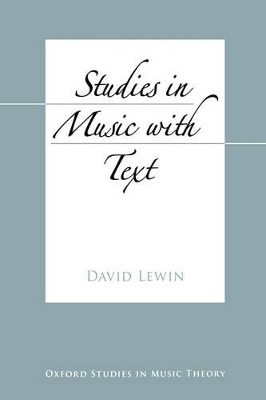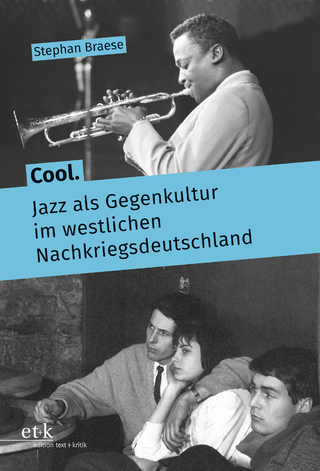
Studies in Music with Text
Oxford University Press Inc (Verlag)
978-0-19-518208-8 (ISBN)
Hailed by the New Grove Dictionary of Music (2nd edition) as "the most original and far-ranging theorist of his generation," David Lewin (1933-2003) explored for over four decades how composers in the German tradition set poetry and drama to music. He conceived Studies in Music with Text as a unified collection, reproducing papers on music by Mozart, Schubert, Wagner, Schoenberg, and Babbitt, many of which have become classics in the fields of music theory and historical musicology. He also included new analytical essays on Mozart, Wagner, and Schubert, and provided fresh readings of selected songs by Clara Schumann, Robert Schumann, and Johannes Brahms.
The analyses collected here focus on how the music, from its small details to its large formal schemes, engages the poetic and dramatic dynamics of the works at hand, and how music and text enact each other reciprocally. A recurrent topic is the theatricality of texted music for the concert as well as operatic stage, and Lewin's perspectives offer many interpretive insights and conceptual perspectives for the musical performer. A methodological eclectic, Lewin cultivated a magisterial command of historical theories and thought deeply about how those theories could inform contemporary understanding. Analytical models by Zarlino, Schenker, Riemann, Rameau, and Babbitt are brought into play, and the range of poetic and dramatic questions that emerge are explored, concerning inter alia psychological and social identity, the relation of psychological inner worlds to phenomenal reality, and the narrowly biographical and broadly historical conditions of artistic creation. As it illuminates the richness and profundity of the language/music partnership, Studies in Music with Text offers incisive thinking about the scope--and limitations--of descriptive and analytical discourse about music.
David Lewin taught composition at UC Berkeley and at SUNY Stony Brook, and later taught music theory at Yale and Harvard Universities. His music-theoretic writings include many articles and two previous books: Generalized Musical Intervals and Transformations (1987), and Musical Form and Transformation (1993). He was the recipient of honorary degrees from the University of Chicago and from the New England Conservatory of Music for his work in music theory.
Introduction
Section I
Introduction.
1. Figaro's Mistakes
2. Musical analysis as stage direction
3. Crudel! perchè finora . . .
Postscript.
Section II
Introduction.
4. Music Theory, Phenomenology, and Modes of Perception
5. Auf dem Flusse: Image and Background in a Schubert Song
6. Ihr Bild
Section III
Introduction
7. Clara Schumann's Setting of "Ich stand"
8. R. Schumann's Anfangs wollt' ich: A study in Phrygian and modern minor
9. Auf einer Burg (In a fortress)
Section IV
Introduction
10. Amfortas's Prayer to Titurel and the Role of D in Parsifal: The Tonal Spaces of the Drama and the Enharmonic Cb/B
11. Some Notes on Analyzing Wagner: The Ring and Parsifal
12. Tristan-well-made-play and theater of passion; the teleology of functional tonality and the self-propagation of transformational atonality
Section V
13. Die Schwestern
Section VI
Introduction.
14. Women's Voices and the Fundamental Bass
15. Toward the Analysis of a Schoenberg Song (Op. 15, No. XI)
16. A Way into Schoenberg's Opus 15, Number 7
17. Vocal Meter in Schoenberg's Atonal Music, with a Note on a Serial Haupstimme
18. Moses und Aron: Some General Remarks, and Analytic Notes for Act I, Scene 1
Section VII
Introduction.
19. Some Problems and Resources of Music Theory
4. Contributors: Not applicable
| Erscheint lt. Verlag | 26.1.2006 |
|---|---|
| Reihe/Serie | Oxford Studies in Music Theory |
| Zusatzinfo | 10 line drawings, 177 music examples |
| Verlagsort | New York |
| Sprache | englisch |
| Maße | 239 x 160 mm |
| Gewicht | 734 g |
| Themenwelt | Kunst / Musik / Theater ► Musik ► Musiktheorie / Musiklehre |
| ISBN-10 | 0-19-518208-1 / 0195182081 |
| ISBN-13 | 978-0-19-518208-8 / 9780195182088 |
| Zustand | Neuware |
| Haben Sie eine Frage zum Produkt? |
aus dem Bereich


